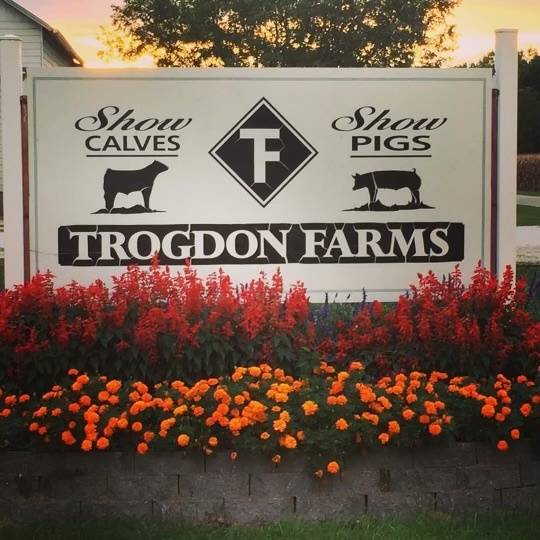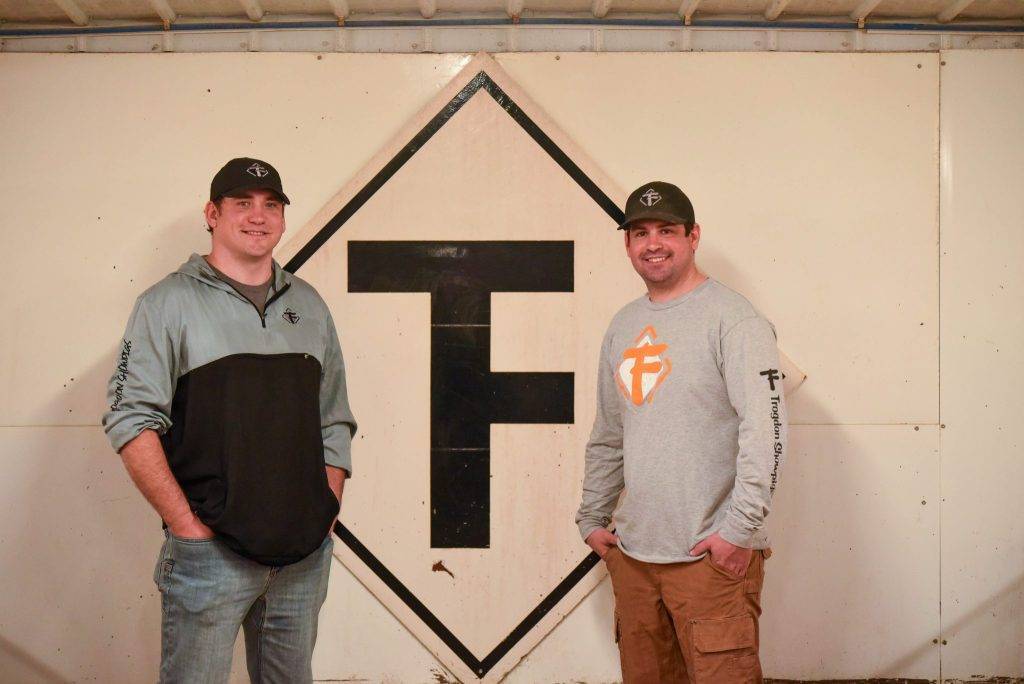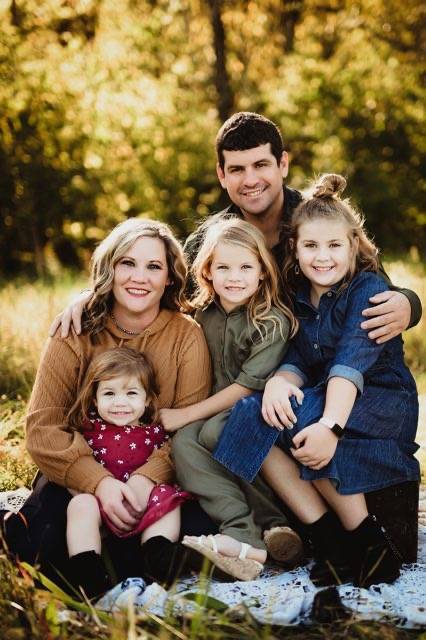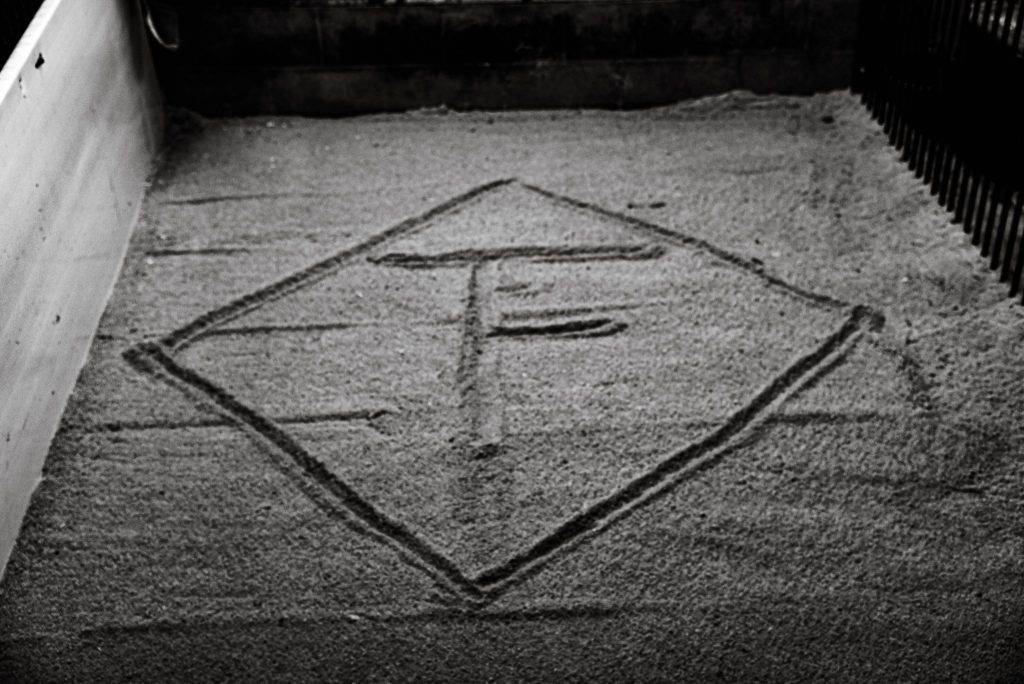Written by DeShea Wallace
Goal setting is not a new idea to those junior members involved in the NJSA. For some, their goal is to win showmanship, while others have their sights set on winning a national show. However, several make it their goal to one day own and operate their very own showpig operation. This was the goal cousins, Jared and Erik Trogdon, had in junior high.
Originally, Trogdon Show Pigs was founded to raise showpigs for the cousins to compete at a county fair level. Since then, they have found success at shows such as OYE and the Illinois State Fair. They now have their sights set on a Grand Champion Barrow banner at a national event.
“We started raising pigs for ourselves for 4-H. With us both being involved in sports growing up, it wasn’t to travel the countryside showing pigs,” Jared recalls. “But nevertheless, it was something we did and tried to do competitively at the county fair level.”
Both Jared and Erik grew up on the family farm in Vermillion, Illinois. There were no pigs to be found on the Trogdon farm until the two started showing and raising them in the 1990s. Trogdon Farms was originally a cattle, corn and soybean operation up until that point.
After high school graduation, both guys went to Lake Land College, just up the road from the farm. The cousins really attribute their time at Lake Land to spurring their competitiveness in the hog show ring.
“We actually lived together at Lake Land and that’s where we really got into raising pigs at a higher level. It was really the people we hung out with. We hung out with the judging team and Blane Olson (Olson Farms) was actually one of our roommates,” Jared says. “That kind of spurred us to start doing it at a more competitive level, because all of those guys did it.”
After finishing up at Lake Land, Jared went to Oklahoma State University. Once he finished up there, he came back home and now works for First Farmers Bank and Trust and spends his time in the showpig barn on the side. Erik on the other hand finished up at Lake Land and now works on the farm doing the day-to-day tasks with the showpigs and helps his Dad and Uncle with the rest of the Trogdon farming operation.
As for the showpig operation, the guys started out with about seven or eight Yorkshire and Hampshire sows. According to Erik, Jared was the Hampshire guy, and he has always been into the Yorkshires. The cousins just started buying some gilts to show in 4-H and then took a few home to breed and the operation has taken off from there. The two joke about how breeders and boar stud owners were their idols growing up. They attribute their start to folks like Tracy Lorenzen, Tom Webster and the “Michael Jordan of showpigs,” Brent Bolen of Hi Point Genetics.
“Brent Bolen lives not too far from here, so he was always a role model,” Jared says.
“He was kind of our idol. We always said he’s the Michael Jordan of the pig world,” Erik interjects. “Back when we started, we wouldn’t use any other boar stud than Hi Point.”
Trogdon Show Pigs has grown immensely since their start back in junior high. Now, Jared and Erik run between 50 to 65 sows across all breeds.
“We try to be a one stop shop. That’s always been our motto in terms of selling them,” Jared says. “Our main focus is just raising good ones. We don’t really care about color, type, kind, but rather just wanting to raise good livestock.”
Standing in what the cousins deem the show barn they mention how it started out as an old commercial chicken house. When the Trogdon’s took it over the barn required quite a few renovations. With only a few showpigs and sows, the boys only had about three makeshift pens in the barn with dirt flooring. Slowly the showpig business started to take over and now the barn is filled with baby pigs waiting to be pictured for their online sales and will be the venue for their upcoming open house.
The changing layout of the farm over time has gone hand in hand with the changing of the twos’ goals. When they started out they mainly wanted to be competitive at their county shows. Now, they want to win a barrow show.
“Obviously you always want to raise that high-dollar boar and one that can be a changer. That is kind of our goal, but in terms of why we do it, it is really because we like to win,” Jared laughs. “Our main goal now is to win a big barrow show. We have done a good job at raising some gilts that have got along really well, we have had some boars that have hit and are doing the right thing, but our main goal now is to win that barrow show.”
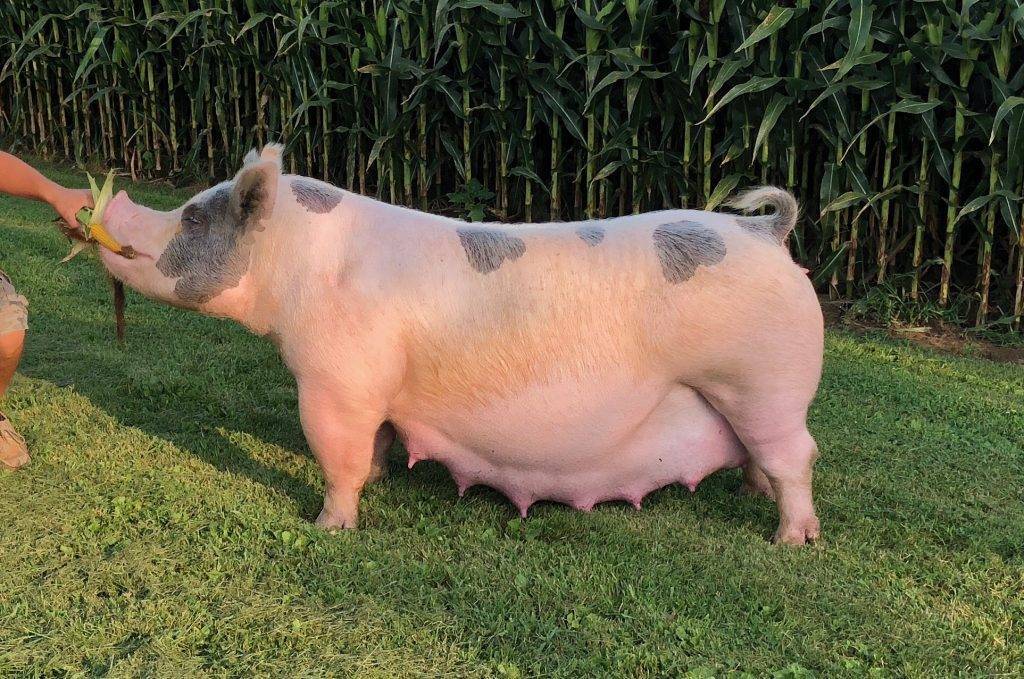
The fact they have come such a long way from their humble beginning is something Erik takes pride in.
“The thing I take the most pride in is where we started compared to how much we have grown,” Erik reminisces. “We didn’t inherit a showpig facility. It isn’t like we got handed an operation that was up and running. We had to build everything ourselves. We have built everything from farrowing houses, nurseries, and show barns. We have truly taken this place from the bottom and got it where it is now.”
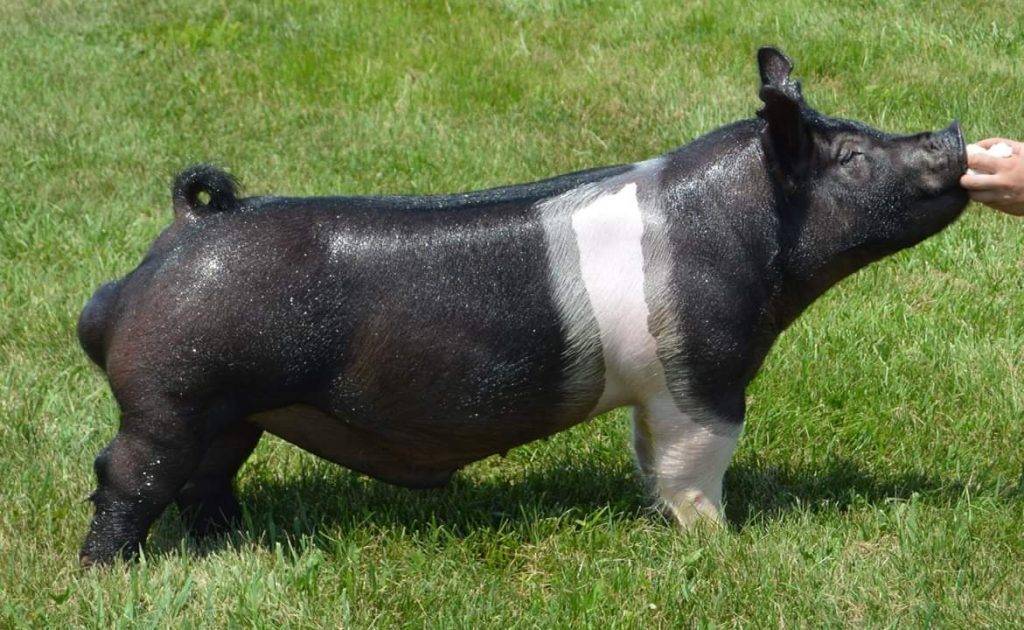
While Jared agrees with Erik that their operation is unique due to its upbringing, he finds it important to mention the livestock that has built their operation up.
“I think the other thing that is pretty unique about our operation is we basically started with one foundation sow on the crossbred side,” he says. “90% of our crossbred sows go back to that foundation sow.”
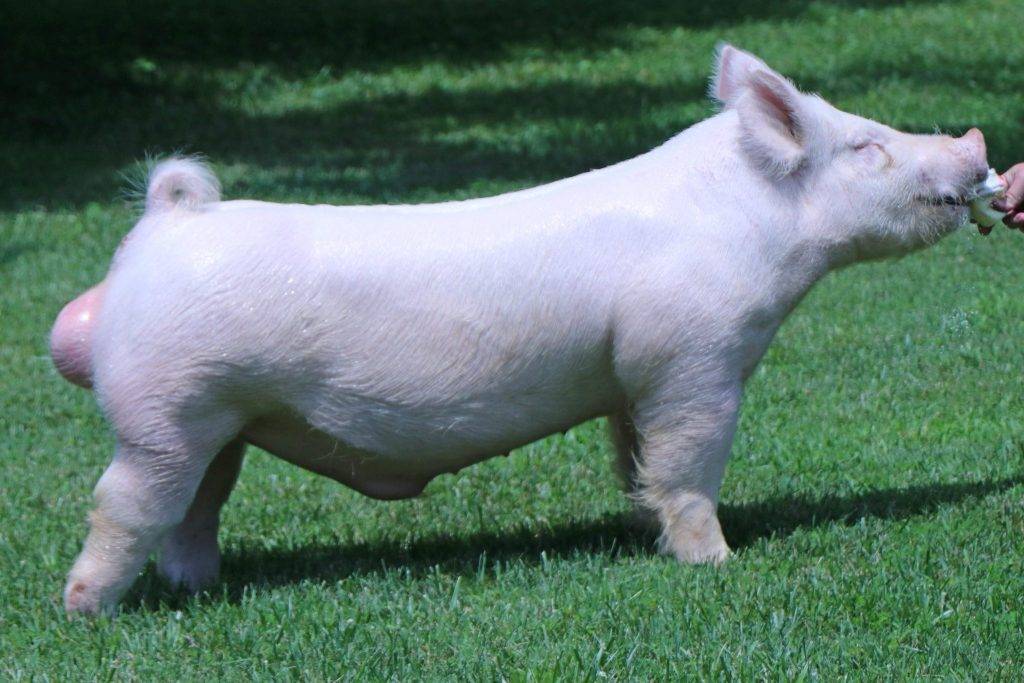
Jared says whether it is right or wrong they aren’t necessarily the type to start something new or trendy each breeding season. Instead, they really try to grow from what they know. They go off of the ones that they know how to breed and what has worked in the past. That has really helped them from a selling standpoint.
“A lot of the stuff you are buying, looking at or breeding from us we can tell you how that is going to work for the most part whether that’s from the sire side or the dam side. That makes everything a little more consistent,” explains Jared.
Erik agrees and says that Micha – the foundation sow- just farrowed her thirteenth litter prior to the interview and he is impressed with that statistic himself. The two also laughed at Micha’s humble start.
“Her first litter had four pigs and we had to pull all four of them,” Jared chuckles. “One of them went on to win the OYE gilt show and one was 18th Overall at OYE.”
That one Solid Monster sow is what really propelled their operation and breeding her became a pivotal moment for Trogdon Show Pigs. Both guys feel like her genetics are what gave them the confidence to know they can be competitive on a larger scale.
The Trogdon cousins are a true testament to what can happen when young NJSA members set goals and have dreams in this industry. They both highlight the importance of making those special connections in the industry and setting goals, but they also signify the importance of sticking to your guns and having some conviction when it comes to breeding.
“My advice to a kid that wants to breed pigs is pick the kind you like and breed them how you like them. Don’t listen to all the hoopla and hearsay. Find the ones you want to use and use them and you will end up liking your livestock better,” Jared says.
Erik echoes Jared’s sentiments.
“Don’t just breed for hype. If you just breed hype then in five years you have a product you don’t like. Whereas if you stick to your guns, styles go in cycles and if you have a style you like in five years it will be right back to where it started and then you are ahead of the game,” says Erik.
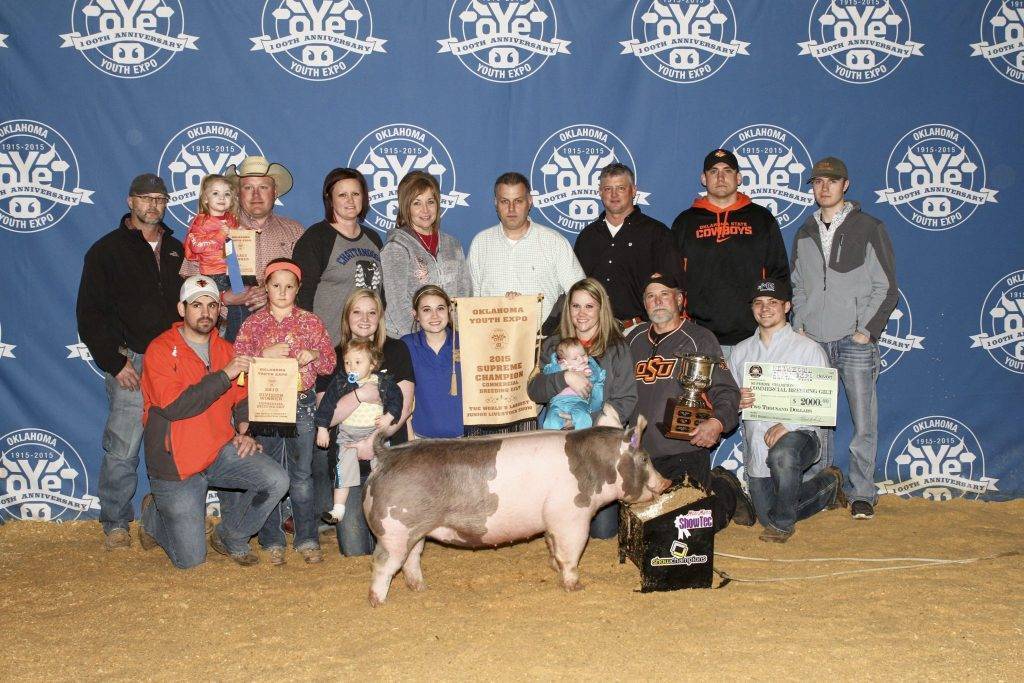
The Trogdons also stress the importance of perseverance. End Game pops up in many pedigrees, big banners have been won at OYE and the Illinois State Fair and somewhere between 12 to 15 boars have been put in stud, all sentiments clearly show that Trogdons have made their mark on the showpig industry. Those accolades didn’t come from a lack of trying. Many hours of studying the pedigrees and livestock and setting goals is what got them on their upward trajectory.
A shining moment for Erik is actually this story being featured in the Seedstock EDGE.
“This is something I have always wanted to do. I always wanted to be featured in the Seedstock EDGE so it has kind of come full circle for me,” Erik says while smiling.
While a lot has changed for Trogdon Show Pigs, one thing that will always remain the same is that it is a family affair. The whole family still sits down together for dinners on Sunday night and they all share the land in Paris, Illinois where they farm, raise cattle and run the showpig operation as a team.
Erik points out that Kristen, Jared’s wife, is the first person on speed dial when he is struggling with farrowing sows. And the family neighbor Scott Funkhouser, who the cousins affectionately call Fireball, is more like an honorary brother. He has always been the one the cousins count on to do the early 4 a.m. checks in the farrowing house and keep the barn up and running. Trogdon’s also rely on a couple of students from Lake Land each semester. While the extra help is nice on the farm, it also gives those students some real industry experience that is beyond compare.
Whether it is a family member or mentors growing up the Trogdons really place their emphasis on the great people and connections in the industry. They both really feel like that is how a junior member will be able to make their way in this industry.
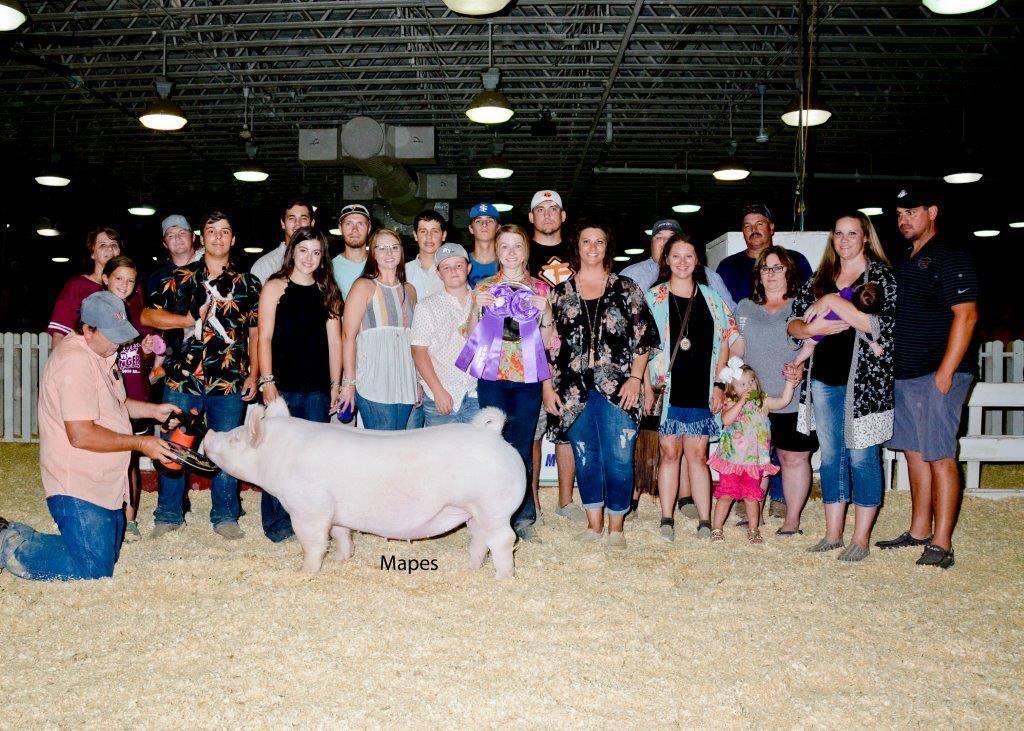
Erik recalls a story from World Pork Expo when he was younger that really sticks with him today.
“I remember it clear as day, I was walking at Expo and Tracy Lorenzen was standing there talking to a bunch of guys. I wasn’t going to bother him while he was talking so I just kept walking. He turned around nudged my shoulder and stuck his hand out. He shook my hand and said, ‘How are you?’” Erik recalls. “That will always stick out in my mind that he did that and that’s how I want to be remembered.”
Erik wants to be a face in the industry that the younger generation can seek advice from, afterall he knows exactly what it is like in their shoes. He wants the cousins to be role models just like Tracy Lorenzen, Tom Webster and Brent Bolen were for them at their beginning.
Jared on the other hand goes back to their livestock.
“I want people to know that you can trust our livestock, you can trust the pedigrees and that it is going to be good livestock,” Jared says. “We want to get our livestock in the right homes and hopefully people succeed with them.”


